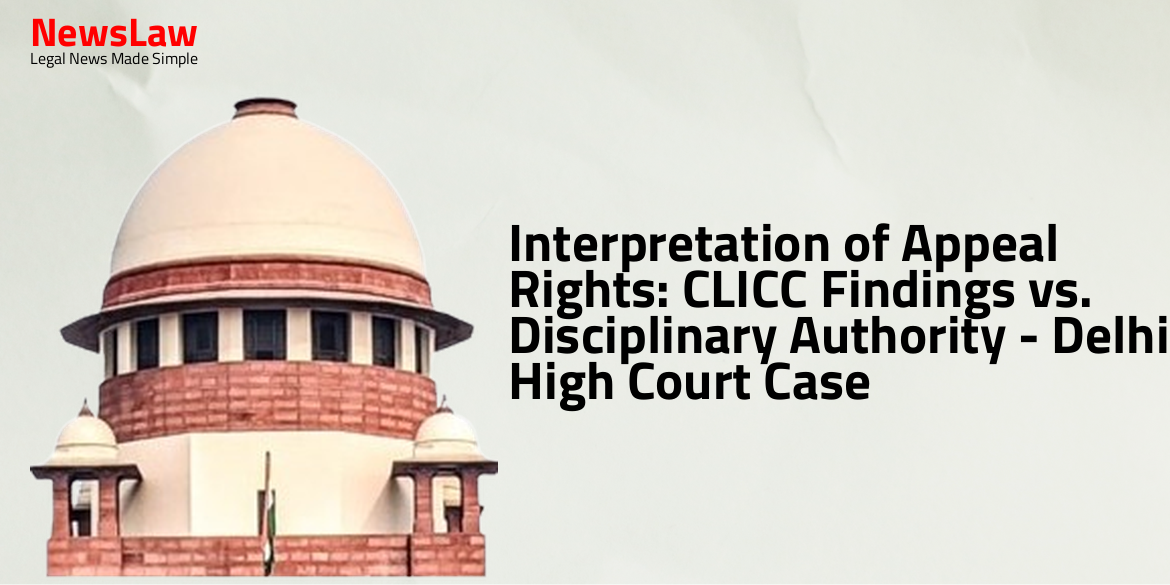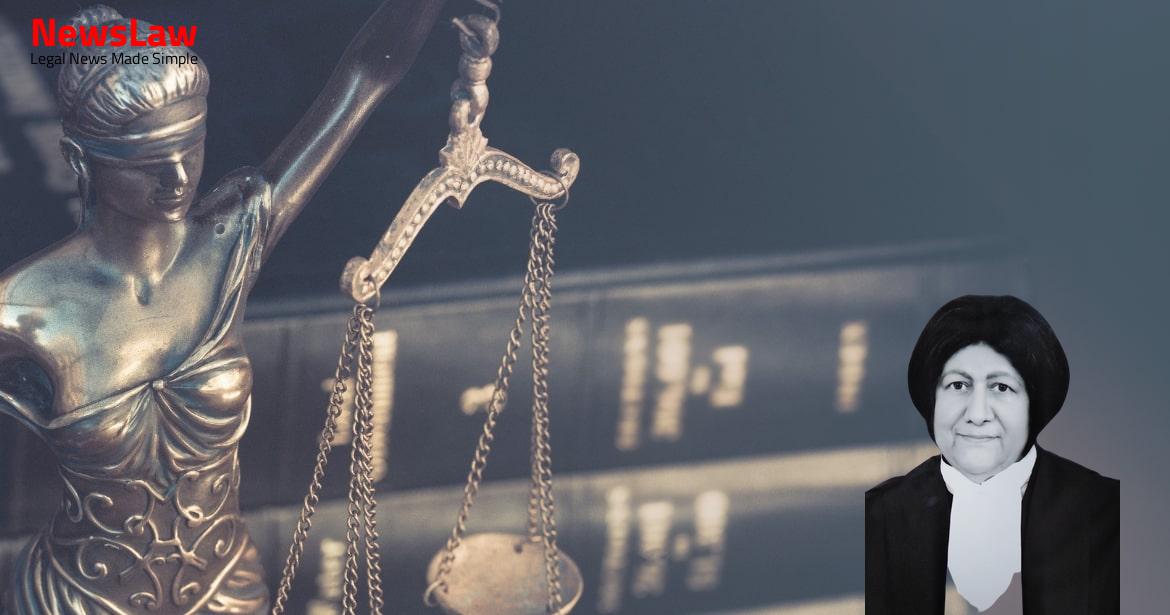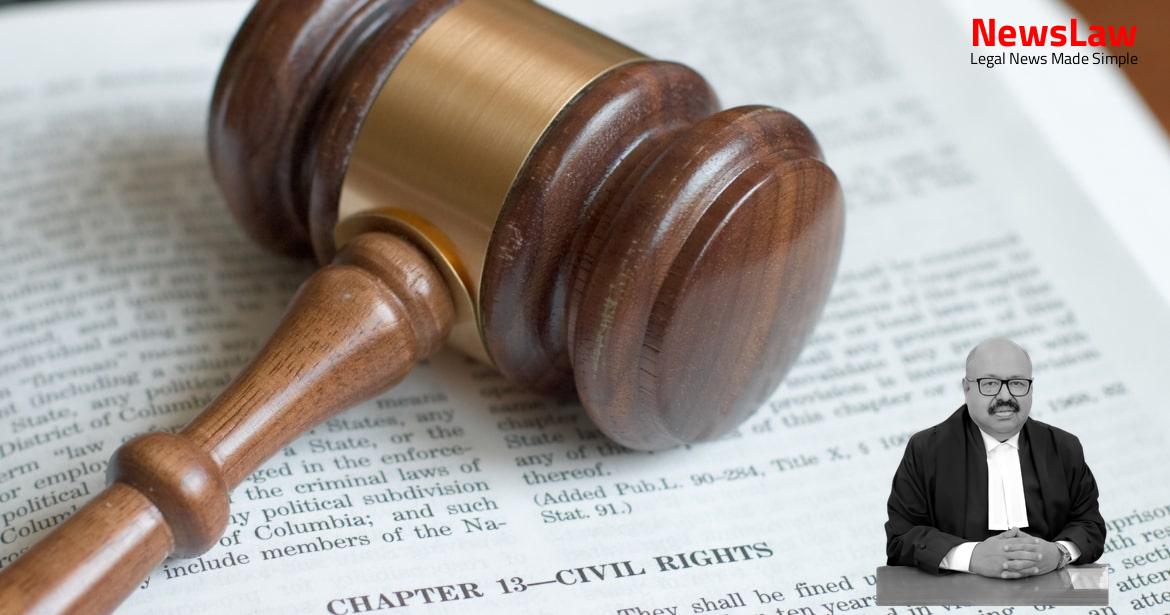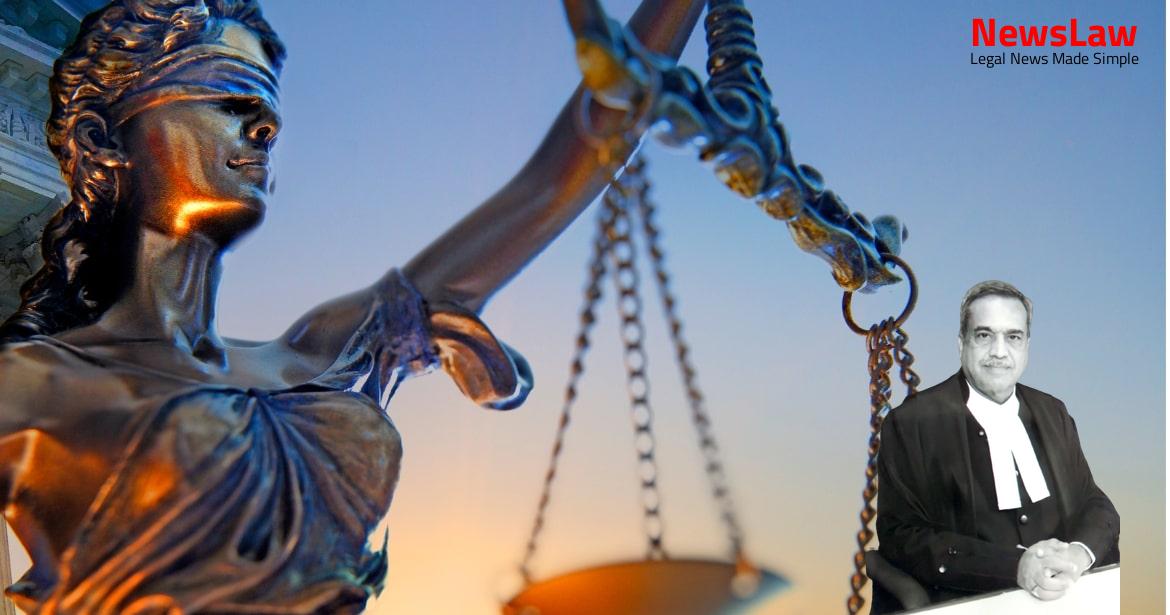In a significant judgment by the Delhi High Court, the case regarding the interpretation of appeal rights in the context of CLICC findings versus the Disciplinary Authority was examined. The Court’s decision sheds light on the complexities of navigating the law in cases where representations against CLICC findings are made to the Disciplinary Authority. This ruling sets a precedent for future cases involving similar issues and clarifies the process for aggrieved individuals seeking recourse. #LegalCase #DelhiHighCourt
Facts
- The Tribunal rejected the Original Application as premature.
- No action has been taken against the petitioner based on the recommendations.
- The rejection was due to the absence of any actions or consequences faced by the petitioner.
Arguments
- The petitioner argues that the appeal under Section 18(1) of the Act of 2013 should be interpreted literally as providing a remedy to challenge the findings of the CLICC before an independent authority.
- The petitioner contends that the Disciplinary Authority is higher and independent than the CLICC, so the representation against the CLICC findings must be considered by the Disciplinary Authority in accordance with the law.
- The petitioner emphasizes that Rule 15 of the Rules of 1965 outlines the steps to be taken after the CLICC report is submitted.
- The petitioner asserts that the appeal under Section 18 of the Act of 2013 must align with the service rules applicable to the aggrieved person.
- The petitioner argues against considering the Disciplinary Authority as a Court or Tribunal for appeal purposes under Section 18 of the Act of 2013.
- The petitioner references previous court judgments to support the interpretation that a representation under Rule 15(2) of the Rules of 1965 serves the purpose of an appeal as contemplated in Section 18 of the Act of 2013.
Analysis
- The petitioner challenged impugned orders, including a letter from the DG, CRPF, which called for a representation within 15 days.
- Inquiry proceedings were conducted under applicable service rules, despite a closure by MHA in 2017.
- The Disciplinary Authority’s decision on penalties may become a formality if the Charged Officer accepts CLICC findings.
- The Act of 2013 and Rules of 1965 provide remedies against CLICC findings, causing a potential conflict.
- The CLICC conducts both Preliminary and Disciplinary Inquiries and issues an Inquiry Report.
- The Central Government can frame rules for appeals under the Act of 2013.
- The UPSC advice has been forwarded to the petitioner for representation.
- Challenging CLICC findings via representation to the Disciplinary Authority satisfies the appeal provision under the Act of 2013.
- Minimal interference by Courts/Tribunals is advised in administrative processes with established remedies.
- The Disciplinary Authority’s role is limited to deciding penalty nature/quantum under the Rules of 1965.
- DoP&T instructions state that if a Complaint Committee does not recommend any action against the accused, the Disciplinary Authority must provide the report to the complainant and consider her representation before making a final decision.
- The representation by the complainant is deemed to be an appeal under Section 18(1) of the Harassment of Women at Workplace (Prevention, Prohibition and Redressal) Act, 2013.
- The report of the Parliamentary Standing Committee on Human Resource Development on the Protection of Women is relied upon.
- Section 13(4) of the Act 2013 mandates the employer (Disciplinary Authority / MHA) to act upon recommendations of the Complaint Committee, making them binding.
- The Disciplinary Authority, who is also the employer of the accused, cannot be viewed as an independent body with no interest in the proceedings.
- The Court in Dr. P.S. Malik-II did not refer to a previous observation of the Supreme Court
- Instead, the Court relied on the Dinesh Chandra Mishra case which was decided earlier
- Coordinate Benches of the Court conclusively held that representation against the recommendations/findings of the CLICC suffice as an appeal.
- Judgments cited by Mr. Rao do not support the submission that the Court must entertain the appeal under Section 18 of the Act.
- The issue is no longer res integra based on the above findings.
- Dinesh Chandra Mishra and Dr. P.S. Malik-II cases are referenced as conclusive on the matter.
- The mentioned judgment will not benefit the petitioner’s case.
Decision
- The petitions along with pending applications are dismissed.
- The petitioner is granted time until May 26, 2024 to submit the representation as advised by UPSC.
- The present petition(s) / appeal(s) under Article 226 / Section 18 of the Act of 2013 are deemed not maintainable.
- The Disciplinary Authority is authorized to act on the report of the CLICC and proceed according to the law.
- After receiving the petitioner’s representation, the Disciplinary Authority must consider the advice of the UPSC and the findings of the CLICC, following the rules of 1965.
- No costs are imposed.
Case Title: KHAJAN SINGH Vs. UNION OF INDIA AND ORS (2024:DHC:4081-DB)
Case Number: W.P.(C)-15201/2023



